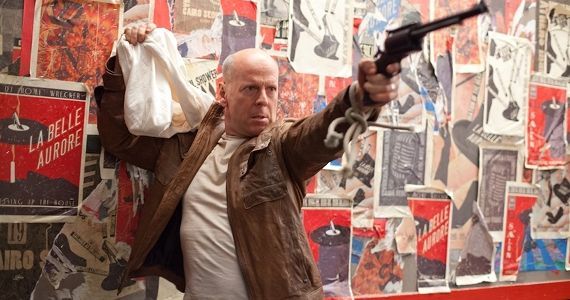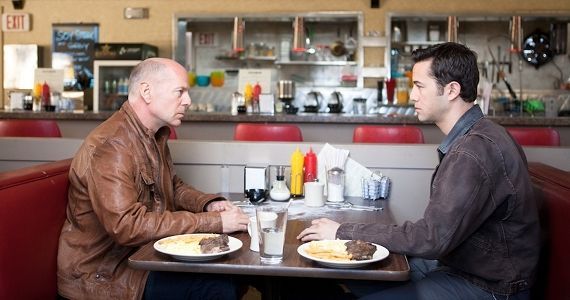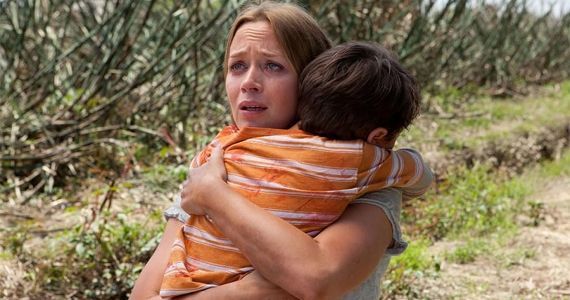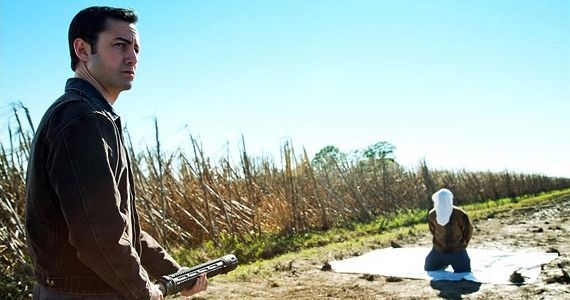Rian Johnson attempts to tackle a mind-bending futuristic thriller with Looper, and he’s taking his Brickstar Joseph Gordon-Levitt along for the ride. Positive buzz started way back in 2011 when Looper wowed audiences at a test screening. Then the film went on to San Diego Comic Con where it left Hall H patrons foaming at the mouth, only to later prove itself at the Toronto International Film Festival.
As the film makes way towards its much-anticipated release, Johnson and Gordon-Levitt took the time to sit down to talk to us about the evolution of Looper, expected DVD and Blu-ray goodies, the potential for a sequel, and more.
Gordon-Levitt leads Looper as Joe – young Joe, to be more specific. Young Joe exists in the year 2044 where he works as a looper, a hitman who kills those the future mob wants to make disappear. Victims are zapped from 2074 back to Joe in 2044, where he blows them away, disposes of the body and claims his payment. Trouble is, in order to finally close the "loop" of perfect crime, a young looper must eventually eliminate his older self, thereby starting the thirty-year countdown to his own demise.
When young Joe fails to eliminate his older self (Bruce Willis), it sets off chain of events that could impact the destiny of the entire world.
[WARNING: Aspects of the Looper plot have NOT been revealed by the trailers. While not SPOILERS, exactly, the following interview DOES touch on some of those yet-unseen plot elements.]
.
.
.
One thing the Looper trailers and TV spots have NOT focused on heavily is why old Joe (Willis) comes back to the past in the first place. Without spoiling anything, let's just say that old Joe wants to see to it that certain world events - which make the year 2074 not very fun for anybody - never come to pass. But aside from familiar "philosophy 101" questions like 'If you could go back in time, would you kill Hitler?' Johnson wants you to ask yourself, "If someone posed a threat to someone you loved, would you take action or just step back and let that enemy be killed in your name?"
The origin of this thought-provoking moral quandary was the first point of interest we had to address with the director.
Screen Rant: Was there any one thing or experience that kicked off this idea?
Rian Johnson: “You know...it was a long time ago now that I wrote the idea, it was about 10 years ago, and I was trying to think what kind of spurred it on and I really cannot remember. The only thing I can grab onto is, at the time, I had just discovered Philip K. Dick and I was reading all of his books. I would read one and two days later go to the bookstore and get the next one. I was literally doing them one by one. I’m sure that had an influence in terms of my head being in that soup of sci-fi ideas. But honestly, it was 10 years ago so I can’t remember if I saw something on the street that made me think something.”
Did things happen in the world over that span of time that modified your original vision?
RJ: “Oh, yeah! Absolutely. Your job as a writer is to soak up the world and just be really present and then put that into the work and everything that is in the movie comes from your own experience and stuff that you’ve soaked up. And especially with a sci-fi film. I think what I love about science fiction and what sci-fi can be really good at is obviously you’re working with outlandish concepts that have very little to do with the real world, like time travel for instance. But what we’re gunning for is to use those outlandish concepts in order to amplify something very human and recognizable. In this case, a young man and an old man sitting across the table from each other and the young man saying, “I’m not gonna turn into you,” and the old man saying, “You’re such an idiot. You’re doing it all wrong. I see where you’re gonna end up. Take my advice,” and that’s obviously a very human, recognizable thing that sci-fi just lets us kind of attack on a grand scale.”
How about the whole kill Hitler angle to the plot? It’s there, but it’s very well grounded.
RJ: “I hope so! Also, it’s weird, that’s like the least interesting question to me. You’re absolutely right that it’s in there, but for me, I don’t know, I couldn’t imagine actually basing a movie on that conundrum. To me, the real question is not, 'Would you go back in time and kill Hitler?' it’s 'If there was someone out there in the world right now whose existence threatened something you loved, would you allow yourself to kill or sit back and let them be killed in your name?' That, to me, is the more pertinent question and that’s the more immediate question, it’s the more relevant question, it’s the more interesting question, I think. And, unfortunately, it’s one that we actually have to deal with day to day.”
Can you tell me about fitting in the telekinesis element? You’re talking about things being grounded and relevant, but with that, you get into superhero territory in a way.
RJ: “Every element of it we tried to ground, that one included. I knew it was something that we had to set up for the Rainmaker and...knocking it down in the beginning and having it just be bar tricks I guess was the way to let it lay down at the start of it at least. It seemed interesting to me.”
Did you get to have any fun with the superhero version and mess around with it a bit?
RJ: “Well, no, not really. In terms of people flying or something like that? No, not really. We kind of just stuck to its place in the story. By the end of it we get into some pretty Akira-style stuff, I guess, but that’s the farthest that we go with it.”
How’s it been doing press for this? I’ve seen all of the trailers, clips, etc., but I never would have guessed where you went with this.
RJ: “Good! And we talked about this when we were doing the movie, just that the marketable elements of it are kind of compartmentalized in the film and there’s this whole other section of it that we knew when we were making it wasn’t going to get shown in trailers and that was really exciting.”
It is kind of in there though.
RJ: “You can go back and see it now, but watching it –you know who’s not in it at all is Pierce [Gagnon]. Pierce has not been in a single frame of promotional material for the movie. And I haven’t had to fight for that. That’s just been a natural occurrence of Sony marketing the film. The kid is not the marketable element of it and so he’s been left out and that’s awesome.”
You think that’ll change when it comes out on DVD and Blu-ray?
RJ: “I hope so, because I think people are really gonna take notice of Pierce.”
How have you both changed since making Brick? Clearly that’s a very different movie, but are there big differences in the way you work now compared to then?
Joseph Gordon-Levitt: “There’s some obvious differences; we’re both somehow older and wiser, but I think the similarities are more striking than the differences. When we made Brick, we had no idea if anybody was gonna see the movie, but we were just making something we thought was really cool. And when we did Looper, we knew lots of people were gonna see the movie, it’s a big Bruce Willis movie, etc., but what I really liked of how Rian approached it was he stuck to the same ethic of how we approached Brick. We weren’t thinking about mass marketing and we weren’t thinking about, 'Will this demographic appreciate this story beat?' or any of that sh*t. It was all basically the same as eight years prior, just making something we thought was really cool.”
Rian tends to reuse a lot of his actors. What is it about him that makes him a particularly appealing 'actor’s director?'
RJ: “Yes, tell me. [Laughs]”
JGL: “[Laughs] There’s a number of things. First of all I just really like the movies that he makes. I think he has a great way with words, which is something I really like. He has a great sense of timing. He’s an editor. I find that a lot of the directors that have actually been editors are often times the best ones. And he’s a real collaborator. He’s done his homework and has a very thorough idea of what he wants, but he remains open to spontaneity and people contributing ideas that differ from what he had originally thought of and, right there, you have the crux of a good director is, when do you let go of your preconceived notion and go with something new that’s being suggested by one of the many other artists you’re working with - and when do you have to say, “No. I appreciate that idea, but I think it’s better that we stick to what I thought we were gonna do.” He walks that line really really well. And I think all of the directors that I’ve worked with who I will call excellent filmmakers do that.”
How fluid can you be with a movie like this? Brick’s a lower budget, less stunts and choreography. Do you have leeway with this to make changes?
RJ: “It depends what you mean by changes. You definitely are still shaping it and sculpting it as you go through the whole process. On set, you’re really focused on trying to get the scene that’s on the page as effectively on the screen as possible, but there are always tweaks that you end up doing. I guess the editing room is the big place where you still sculpt it. As intricate as it seems like it would be, and as totally locked in place it seems like the story is, I think it’d be surprising if people saw how much it evolved and changed in the editing room.
The first cut of this movie was two hours and 45 minutes long. We cut nearly an hour’s worth of really good scenes. Some of the scenes we cut are my favorite scenes in the film. You have to have everything serve the whole and so a lot of that stuff had to go just because it wasn’t part of the main narrative spine that ended up taking over the film. So yeah, it’s actually very much influx up until the last day of editing when they pry your hands off of the Avid. You have to be open to, at every turn, realizing you can still make it better, you can still make it clearer, and you can still make it more effective, and being willing to do what you need to do to get there.”
Is there any one scene you took out you wish you could put back?
RJ: “No, everything’s out for a reason. There’s stuff that I’m really excited for people to see. There’s some great stuff with Noah Segan who plays Kid Blue. One of my favorite scenes, there’s a scene where he questions a cop and there’s a terrific scene between the two of them. You’ll see when the DVD comes out, but there’s some really nice stuff. That’s the other thing: I would never put any of those scenes back in the movie as a director’s cut. They came out for a reason.”
Question for you both: You’re a looper, your older self is zapped back to you. Do you shoot him and take the money?
RJ: “Oh my god! We made the whole movie to have to not answer that question. [Laughs] Part of what we tried to do was set up a world where you see why these guys are loopers and why they’re doing what they’re doing, so it’s hard to answer in that context of us being us. It’s a situation we would never let ourselves be in.”
JGL: “No, I don’t think I’d take that job. I mean from the beginning. Not that I wouldn’t pull the trigger - I’m saying I would never sign up to be a looper.”
RJ: “You’ve gotta be a pretty desperate man to be a looper.”
JGL: “I’m way too lucky to have to resort to professional murder.”
RJ: “Professional murder for bars of silver? Not your jam?”
But it’s gold at that point!
RJ: “[Laughs] That’s true!”
Sequels can be a touchy topic, but with this, I really can’t help but to want more. Have you considered it?
RJ: “No, not really. It’s really cool to hear that the world is intriguing, but to me the world was created in the service of this one specific story and that was its function in my mind and we told that story. In my mind, I’m not thinking sequels.”
-
Looper opens in theaters this weekend.
Follow me on twitter on @PNemiroff.




